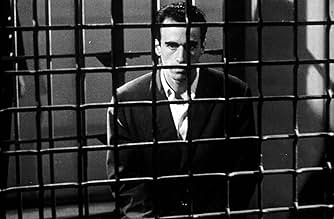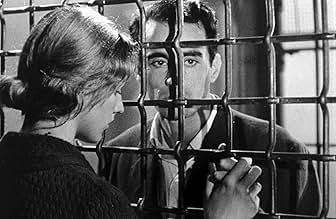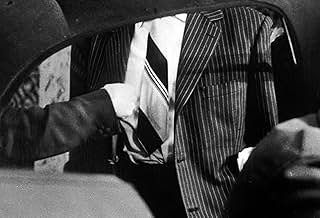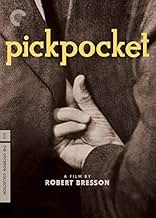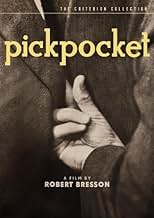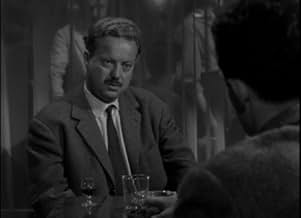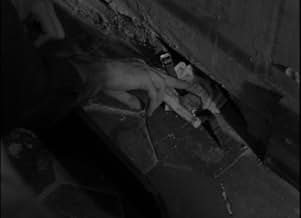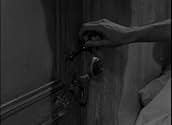Pickpocket
- 1959
- Tous publics
- 1h 16min
NOTE IMDb
7,6/10
27 k
MA NOTE
Michel est libéré de prison après avoir purgé une peine pour vol. Sa mère meurt et il a recours au vol à la tire pour survivre.Michel est libéré de prison après avoir purgé une peine pour vol. Sa mère meurt et il a recours au vol à la tire pour survivre.Michel est libéré de prison après avoir purgé une peine pour vol. Sa mère meurt et il a recours au vol à la tire pour survivre.
- Réalisation
- Scénario
- Casting principal
- Récompenses
- 3 nominations au total
Avis à la une
More interesting than any individual film, it's Bresson's philosophy that I feel is worth examining. He's all about striving, the question is what for? If it's purity, as most would agree, and purity always seems like something to aspire to, is it a purity that we can take as a base for living?
I don't think I will have conclusions before Balthazar, perhaps his most famous. Already, since Diary of a Priest, I can see him moving in a direction, growing that philosophy. Even more sparse, even more laconic, removes flourish and leaves bare floors so that we endure something being revealed in the pacing. That's fine. More revealing is another trajectory being delineated, human- based.
It's once more about a lone youth who struggles with a life that suffocates. In Diary he was a pious young priest who wanted absolute sincerity in the face of life; but people were complicated beings, the journey caused spiritual torment, questions of angst abounded. In Man Escaped the same youth becomes a prisoner, also endures a life of anguish, but now endures quietly, without torment and piety. It was Bresson peeling away the romanticizing of suffering of Diary, what was left was simply the work of breaking free from that prison- world, stoicism in place of romanticism.
So what does he do in this next one? The same youth once more, but now he's not bound by duty to truth or has any work set out before him. Now he's free to wander the world which the man in Escaped had struggled to break free to. Without an intellectual or other struggle before him, he's simply awash with time. He's stifled by the freedom, he has no place. He perceives himself as a man of lofty talents, possibly a genius, but wastes these talents in being a pickpocket around town who won't even go see his dying mother. He always comes and goes from his tiny apartment to no real purpose.
Observant viewers will note the equation of pickpocketing as presented in the film, an elaborately precise choreography of hands and motions, with Bresson's own filmmaking. Film lore touts him as pure and simple as if that simplicity is conquered without effort, in truth he's all about the meticulous timing and moving of exact pieces. His favorite tool is exactly this game of hide and show that controls what we see; for example a scene like in Man Escaped where the new cellmate is introduced off-camera, we don't know who our man is talking to until we turn to see. He does it here too, often by having characters turn and leave, questions hanging, creating gap and resonance. He's the opposite of natural.
Back to the conundrum expressed at the beginning however; if this is pure, what does it strive purely for?
The only answer I get here is that we no longer have a man who is trying to understand life, or someone who works towards an end, these selves have been shed. Now we have someone who endures, but has no idea exactly what or what for. It's Bresson inching towards the same cessation that he strives for visually. What stands before him now is what he sketches in the opening intertitle; something pushes the man from the inside.
He bangles this all up at the end, and I believe that looking back he would probably have been unsatisfied himself. He reverts back to his romanticism where the tormented young man has love reserved for him, but a wistful love that doesn't feel earned, there's simply nothing that rings true about her infatuation with him. This is Eva Green's aunt by the by.
So this has done its job, shed one self and one set of conundrums and replaced them with another. Onwards to his next, which looks like another draft of the same philosophy, and then Balthazar is around the corner. I already believe I disagree with Schrader.
I don't think I will have conclusions before Balthazar, perhaps his most famous. Already, since Diary of a Priest, I can see him moving in a direction, growing that philosophy. Even more sparse, even more laconic, removes flourish and leaves bare floors so that we endure something being revealed in the pacing. That's fine. More revealing is another trajectory being delineated, human- based.
It's once more about a lone youth who struggles with a life that suffocates. In Diary he was a pious young priest who wanted absolute sincerity in the face of life; but people were complicated beings, the journey caused spiritual torment, questions of angst abounded. In Man Escaped the same youth becomes a prisoner, also endures a life of anguish, but now endures quietly, without torment and piety. It was Bresson peeling away the romanticizing of suffering of Diary, what was left was simply the work of breaking free from that prison- world, stoicism in place of romanticism.
So what does he do in this next one? The same youth once more, but now he's not bound by duty to truth or has any work set out before him. Now he's free to wander the world which the man in Escaped had struggled to break free to. Without an intellectual or other struggle before him, he's simply awash with time. He's stifled by the freedom, he has no place. He perceives himself as a man of lofty talents, possibly a genius, but wastes these talents in being a pickpocket around town who won't even go see his dying mother. He always comes and goes from his tiny apartment to no real purpose.
Observant viewers will note the equation of pickpocketing as presented in the film, an elaborately precise choreography of hands and motions, with Bresson's own filmmaking. Film lore touts him as pure and simple as if that simplicity is conquered without effort, in truth he's all about the meticulous timing and moving of exact pieces. His favorite tool is exactly this game of hide and show that controls what we see; for example a scene like in Man Escaped where the new cellmate is introduced off-camera, we don't know who our man is talking to until we turn to see. He does it here too, often by having characters turn and leave, questions hanging, creating gap and resonance. He's the opposite of natural.
Back to the conundrum expressed at the beginning however; if this is pure, what does it strive purely for?
The only answer I get here is that we no longer have a man who is trying to understand life, or someone who works towards an end, these selves have been shed. Now we have someone who endures, but has no idea exactly what or what for. It's Bresson inching towards the same cessation that he strives for visually. What stands before him now is what he sketches in the opening intertitle; something pushes the man from the inside.
He bangles this all up at the end, and I believe that looking back he would probably have been unsatisfied himself. He reverts back to his romanticism where the tormented young man has love reserved for him, but a wistful love that doesn't feel earned, there's simply nothing that rings true about her infatuation with him. This is Eva Green's aunt by the by.
So this has done its job, shed one self and one set of conundrums and replaced them with another. Onwards to his next, which looks like another draft of the same philosophy, and then Balthazar is around the corner. I already believe I disagree with Schrader.
Pickpocket is a film that apparently has serious flaws- from the very beginning it displays little to no emotion as the actors on screen just say their lines and the camera just follows them from a distance, with no close-ups or any other tricks.
But what is unique about this film is that this very criticism is actually a deliberate attempt to cause uneasiness in the viewer. And it succeeds- the anxiety, as felt by the pickpocket in his everyday living, is also transmitted to us. So, to correct my previous statement: this movie does not lack emotions- it has emotions: anxiety, uncertainty, but these are delivered in an unconventional manner.
From a personal standpoint, I wasn't sure if I liked it or not. It is hard to appreciate this dimension of the film at first. But after seeing some extras from the excellent Criterion package, I was able to understand better. How Bresson actually committed to cause these emotions in the viewer, how he re-shot several times various scenes until the actors just repeated their lines, until no trait of emotions were left. Michel's narration voice-over is flat, plain. These were non-professional actors set to work in a non-standard way, Bresson's way. And the result is this: a film somewhat off-putting, but still a great work of art.
But what is unique about this film is that this very criticism is actually a deliberate attempt to cause uneasiness in the viewer. And it succeeds- the anxiety, as felt by the pickpocket in his everyday living, is also transmitted to us. So, to correct my previous statement: this movie does not lack emotions- it has emotions: anxiety, uncertainty, but these are delivered in an unconventional manner.
From a personal standpoint, I wasn't sure if I liked it or not. It is hard to appreciate this dimension of the film at first. But after seeing some extras from the excellent Criterion package, I was able to understand better. How Bresson actually committed to cause these emotions in the viewer, how he re-shot several times various scenes until the actors just repeated their lines, until no trait of emotions were left. Michel's narration voice-over is flat, plain. These were non-professional actors set to work in a non-standard way, Bresson's way. And the result is this: a film somewhat off-putting, but still a great work of art.
This slow burn film from Robert Bresson is not going to be to everyone's taste, and I'm not sure it was to mine. It's a film I admired more than enjoyed.
It tells the story of a man who's addicted to theft, or maybe more accurately addicted to the rush of getting away with theft, or maybe more accurately addicted to the rush of possibly being caught thieving. It's not a long movie but it may try your patience, as it's very slow and very quiet. The main character is a bit of a blank slate, and he remains so. We never learn much about him, and I personally didn't feel especially invested in what happened to him. It was only in reading about the film after seeing it that I found out the ending is considered to be remarkable among film scholars, but I didn't react to it much myself.
The best scenes in the movie are those that show the elaborate rituals that exist among pickpocket teams, and the pretty amazing feats they pull off. They're like magicians who use sleight of hand for nefarious purposes.
Grade: B+
It tells the story of a man who's addicted to theft, or maybe more accurately addicted to the rush of getting away with theft, or maybe more accurately addicted to the rush of possibly being caught thieving. It's not a long movie but it may try your patience, as it's very slow and very quiet. The main character is a bit of a blank slate, and he remains so. We never learn much about him, and I personally didn't feel especially invested in what happened to him. It was only in reading about the film after seeing it that I found out the ending is considered to be remarkable among film scholars, but I didn't react to it much myself.
The best scenes in the movie are those that show the elaborate rituals that exist among pickpocket teams, and the pretty amazing feats they pull off. They're like magicians who use sleight of hand for nefarious purposes.
Grade: B+
To my previous comments, I should like to add/correct. When I said that Kassagi, who plays "first accomplice" (1er complice), was a 'real-life pickpocket who served as the film's technical consultant' I was not only inaccurate, but the fact that Kassagi was actually a stage magician has some bearing on the film itself, for although the scene in which the pickpockets rip off a series of train passengers is authentic in that it shows how pickpockets operate in terms of teamwork and speed, nevertheless, the moment when Kassagi (?) 'neatly replac[es] the lightened wallet [back] in a man's pocket' is not something a real pickpocket would likely do; it is, however, exactly what a stage magician would do. A real pickpocket has no audience (or so he hopes) whereas a magician wants the audience to see him make a monkey of the hapless "volunteer from the audience." In this case, Kassagi's idea (as I am sure it was) provides a brief moment of comic relief in the middle of a movie that is otherwise without a lot of humor. It is a welcome touch and Bresson was wise to keep it in. Now, I also engaged in a fallacy when I said that 'American pickpockets traditionally prefer to steal from behind to avoid any chance of a mark seeing their faces.' In reality, American pickpockets take from behind because of necessity: even by 1959 when 'Pickpocket" was released, American men more and more carried their wallets in the hip pocket whereas European men, as can be seen in this film, continued to use the inside breast pocket. While the business about seeing the mark's face is part of the lore of American petty criminals, it is not the cause of the American style of picking pockets, but rather a rationalization after the fact.
Probably the most influential of Robert Bresson's trio of masterpieces from the Fifties (the other two being *A Man Escaped* and, of course, *Diary of a Country Priest*). *Pickpocket* sowed its seeds of influence in the minds of any number of film artists -- Jean-Pierre Melville most notably (who despised Bresson, apparently), whose *Le Samourai* was a mighty struggle against this film . . . and, most completely, writer-director Paul Schrader, who, you'll recall, wrote the *Taxi Driver* screenplay, which was another story about a loner on the outside of societal norms. And it goes without saying that Schrader's *American Gigolo*, which he also directed, is a virtual rewrite of *Pickpocket*, right down to the egregiously plagiarized finale.
The subject of Bresson's film is not nearly as sexy a conception as Schrader's gigolo, though the milieu is equally as sleazy. Instead of preening Richard Gere, we get acting novice Martin LaSalle as the Pickpocket, who wears one suit through the entire film. (Schrader obviously thought he was being clever by giving Gere a large closet stuffed with designer suits). LaSalle lives in a crumbly walk-up flat in Paris, where his books gather dust and the baseboards hide his humble stash of francs and the occasional wristwatch. He has few friends and is too ashamed to visit his dying mother (I won't spoil the reason why). The only pleasure he derives is from his compulsive work as a pickpocket, and it is in these scenes that Bresson stuns us with his martinet control of both narrative pacing and camera placement. The director lovingly shows us the subtle skills of the street thief: the creeping hands, the split-second scams (such as lifting a wallet from a man's suit breast-pocket while standing next to him and pretending to read a newspaper), the choreographed celerity of movement when the thief works with his partners in crime. There's one sequence that follows LaSalle and his two accomplices from a train station all the way to the train, in which they lift about 15 wallets and the occasional purse. The camera-work and editing here is nothing less than sheer mastery -- a ballet of thievery. And let it also be said that Bresson is no slouch when it comes to suspense. It's an intimate and sweaty suspense: will LaSalle's fingers, as they slowly reach into a purse, be noticed?
As might be expected from a French director of the period, there's also plenty of philosophizing to be found here, and in this case, the philosophy is actually pretty interesting. The movie takes as its intellectual parents the ubermensch riff by Nietzsche and Dostoyevsky's "Crime and Punishment". LaSalle asks the cop who's on his trail if society's "supermen", even if they choose to be thieves, should not only be let alone, but even respected as an overall benefit to society. (Thus sprach Kenneth Lay!) Obviously, we can mull that over ourselves, but in the meantime, Bresson is not particularly impressed with the "decent" elements of society. The cop is a pompous blow-hard who can offer LaSalle no alternative to his criminality. Bresson is more or less saying that modern society is contemptible: your acceptance of that thesis, and the importance you place on the occasional 100 francs getting lifted from an overfed bourgeois, will ultimately determine your acceptance of this film.
But perhaps its style will bog you down. As per usual, Bresson breaks virtually every rule of the movies. The use of non-actors in the main roles engenders both assets and liabilities: while the avoidance of the typical actors' nonsense is a definite asset, the liabilities occur when Bresson asks his "interpreters" to finally, well, act. There are a few scenes here where the incompetence of LaSalle (he eventually became a fine actor, but he was virtually plucked off the street by Bresson in 1958) will make you cringe, especially when LaSalle is supposed to be angry with someone. There IS something to be said for professionals -- even professional actors. And if none of this puts you off, perhaps Bresson's perverse narrative style -- including scenes in which a character writes down on a piece of paper the following narrative action, to be followed by the character READING what he has just written down, and climaxed by the character DOING just what he wrote and said he was going to do -- will make you scratch your head and mutter something about the arty pretensions of French directors.
And your comments would certainly be justified in Bresson's later productions. But in *Pickpocket*, I feel, the narrative precision, lack of bloat (the movie is 75 minutes long), and broader philosophical questions coalesce into a stringent masterpiece that must finally win your respect. Besides: you gotta love a movie about a pickpocket who never bothers to lock, or even close, his own front door. See? Bresson can even be funny.
8 stars out of 10.
The subject of Bresson's film is not nearly as sexy a conception as Schrader's gigolo, though the milieu is equally as sleazy. Instead of preening Richard Gere, we get acting novice Martin LaSalle as the Pickpocket, who wears one suit through the entire film. (Schrader obviously thought he was being clever by giving Gere a large closet stuffed with designer suits). LaSalle lives in a crumbly walk-up flat in Paris, where his books gather dust and the baseboards hide his humble stash of francs and the occasional wristwatch. He has few friends and is too ashamed to visit his dying mother (I won't spoil the reason why). The only pleasure he derives is from his compulsive work as a pickpocket, and it is in these scenes that Bresson stuns us with his martinet control of both narrative pacing and camera placement. The director lovingly shows us the subtle skills of the street thief: the creeping hands, the split-second scams (such as lifting a wallet from a man's suit breast-pocket while standing next to him and pretending to read a newspaper), the choreographed celerity of movement when the thief works with his partners in crime. There's one sequence that follows LaSalle and his two accomplices from a train station all the way to the train, in which they lift about 15 wallets and the occasional purse. The camera-work and editing here is nothing less than sheer mastery -- a ballet of thievery. And let it also be said that Bresson is no slouch when it comes to suspense. It's an intimate and sweaty suspense: will LaSalle's fingers, as they slowly reach into a purse, be noticed?
As might be expected from a French director of the period, there's also plenty of philosophizing to be found here, and in this case, the philosophy is actually pretty interesting. The movie takes as its intellectual parents the ubermensch riff by Nietzsche and Dostoyevsky's "Crime and Punishment". LaSalle asks the cop who's on his trail if society's "supermen", even if they choose to be thieves, should not only be let alone, but even respected as an overall benefit to society. (Thus sprach Kenneth Lay!) Obviously, we can mull that over ourselves, but in the meantime, Bresson is not particularly impressed with the "decent" elements of society. The cop is a pompous blow-hard who can offer LaSalle no alternative to his criminality. Bresson is more or less saying that modern society is contemptible: your acceptance of that thesis, and the importance you place on the occasional 100 francs getting lifted from an overfed bourgeois, will ultimately determine your acceptance of this film.
But perhaps its style will bog you down. As per usual, Bresson breaks virtually every rule of the movies. The use of non-actors in the main roles engenders both assets and liabilities: while the avoidance of the typical actors' nonsense is a definite asset, the liabilities occur when Bresson asks his "interpreters" to finally, well, act. There are a few scenes here where the incompetence of LaSalle (he eventually became a fine actor, but he was virtually plucked off the street by Bresson in 1958) will make you cringe, especially when LaSalle is supposed to be angry with someone. There IS something to be said for professionals -- even professional actors. And if none of this puts you off, perhaps Bresson's perverse narrative style -- including scenes in which a character writes down on a piece of paper the following narrative action, to be followed by the character READING what he has just written down, and climaxed by the character DOING just what he wrote and said he was going to do -- will make you scratch your head and mutter something about the arty pretensions of French directors.
And your comments would certainly be justified in Bresson's later productions. But in *Pickpocket*, I feel, the narrative precision, lack of bloat (the movie is 75 minutes long), and broader philosophical questions coalesce into a stringent masterpiece that must finally win your respect. Besides: you gotta love a movie about a pickpocket who never bothers to lock, or even close, his own front door. See? Bresson can even be funny.
8 stars out of 10.
Le saviez-vous
- AnecdotesBanned in Finland until 1965 because of its depiction of authentic pickpocketing techniques.
- ConnexionsEdited into Histoire(s) du cinéma: Une histoire seule (1989)
- Bandes originalesSuite de symphonies d'Amadis (selection)
(uncredited)
Music by Jean-Baptiste Lully (as J.B. Lulli)
Éditions Transatlantiques
Meilleurs choix
Connectez-vous pour évaluer et suivre la liste de favoris afin de recevoir des recommandations personnalisées
- How long is Pickpocket?Alimenté par Alexa
Détails
Box-office
- Montant brut mondial
- 7 541 $US
- Durée1 heure 16 minutes
- Couleur
- Rapport de forme
- 1.37 : 1
Contribuer à cette page
Suggérer une modification ou ajouter du contenu manquant

Lacune principale
By what name was Pickpocket (1959) officially released in India in English?
Répondre

